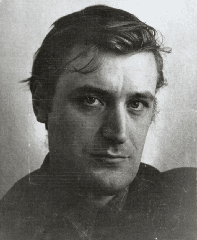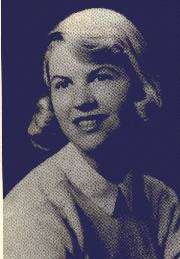Ted Hughes
Source: http://marbl.library.emory.edu/Events/hughesconference.html
Hawk Roosting
I sit in the top of the wood, my eyes closed.Inaction, no falsyfing dreamBetween my hooked head and hooked feet:Or in sleep rehearse perfect kills and eat. The convenience of the high trees!The air's buoyancy and the sun's rayAre of advantage to me;And the earth's face upward for my inspection. My feet are locked upon the rough bark.It took the whole of CreationTo produce my foot, my each feather:Now I hold Creation in my foot Or fly up, and revolve it all slowly—I kill where I please because it is all mine.There is no sophistry in my body:My manners are tearing off heads— The allotment of death.For the one path of my flight is directThrough the bones of the living.No arguments assert my right: The sun is behind me.Nothing has changed since I began.My eye has permitted no change.I am going to keep things like this.
Source:
http://plagiarist.com/poetry/9249/
Sylvia Plath
Source: http://www.literaryhistory.com/20thC/Plath.htm
DADDY
You do not do, you do not do
Any more, black shoe
In which I have lived like a foot
For thirty years, poor and white,
Barely daring to breathe or Achoo.
Daddy, I have had to kill you.
You died before I had time---
Marble-heavy, a bag full of God,
Ghastly statue with one grey toe
Big as a Frisco seal
And a head in the freakish
Where it pours bean green over blue
In the waters off beautiful Nauset.
I used to pray to recover you.
Ach, du.
In the German tongue, in the Polish town
Scraped flat by the roller
Of wars, wars, wars.
But the name of the town is common.
My Polack friend
Says there are a dozen or two.
So I never could tell where you
Put your foot, your root,
I never could talk to you.
The tongue stuck in my jaw.
It stuck in a barb wire snare.
Ich, ich, ich, ich,
I could hardly speak.
I thought every German was you.
And the language obscene
An engine, an engine
Chuffing me off like a Jew.
A Jew to
I began to talk like a Jew.
I think I may well be a Jew.
The snows of the Tyrol, the clear beer of
Are not very pure or true.
With my gypsy ancestress and my weird luck
And my Taroc pack and my Taroc pack
I may be a bit of a Jew.
I have always been scared of *you*,
With your Luftwaffe, your gobbledygoo.
And your neat mustache
And your Aryan eye, bright blue.
Panzer-man, panzer-man, O You---
Not God but a swastika
So black no sky could squeak through.
Every woman adores a Fascist,
The boot in the face, the brute
Brute heart of a brute like you.
You stand at the blackboard, daddy,
In the picture I have of you,
A cleft in your chin instead of your foot
But no less a devil for that, no not
Any less the black man who
Bit my pretty red heart in two.
I was ten when they buried you.
At twenty I tried to die
And get back, back, back to you.
I thought even the bones would do.
But they pulled me out of the sack,
And they stuck me together with glue.
And then I knew what to do.
I made a model of you,
A man in black with a Meinkampf look
And a love of the rack and the screw.
And I said I do, I do.
So daddy, I'm finally through.
The black telephone's off at the root,
The voices just can't worm through.
If I've killed one man, I've killed two---
The vampire who said he was you
and drank my blood for a year,
Seven years, if you want to know.
Daddy, you can lie back now.
There's a stake in your fat, black heart
And the villagers never liked you.
They are dancing and stamping on you.
They always *knew* it was you.
Daddy, daddy, you bastard, I'm through.
Source: http://www.sylviaplath.de/plath/daddy.html
In this paper we have to analyse the difference between
women and men. To do this, we have chosen two poems, “Daddy” and “Hawk
Roosting”, written by a woman and a man.
The
poem “Daddy” is clearly viewed as a poem written by a woman. In fact, Sylvia
Plath wrote it to express her feelings and her despair related to two figures,
firstly to her father and secondly to her husband. Moreover, she describes the
state of submissiveness adopted by many women.
In
this poem, Plath is describing two men (her father and her husband) who are
almost the same person. To understand better this poem it is necessary to
mention essential facts of Sylvia’s life. “Sylvia
Plath was born in
To
refer to the poem itself, “Daddy” is a poem which contains too much hatred. It
is divided into 16 stanzas, each one with five lines.
The
first stanza describes the moment in which Sylvia Plath has decided to be free,
to live without suffering because of her father and her husband. To express
this, she uses a metaphor; “during all her life she has been living in a black
shoe” (lines 2 and 3).
Then,
she expresses “Daddy”, I have had to kill you” (line 6), this means that to
achieve all her freedom, she has had to forget her father. She feels that she
has to kill him because her father has damaged her in two different ways, in
life because he was an authoritarian person and in death because Plath has felt
as an abandoned child.
The
next stanzas (until the nineth), Sylvia illustrates her father’s figure as a
Nazi, a severe and a strict man. And moreover, she describes herself as a Jew
(line 33) who never could talk to a Nazi (her father).
In
the tenth stanza, she mentions her husband, when she says in line 48 “every
woman adores a Fascist”. Now, she is admitting that although her husband was
like her father, she really loves him. And after, she talks directly to her
father telling him that she feels much damaged because of his death.
Furthermore, she admits that she has tried to kill herself (“at twenty I tried
to die and get back, back, back to you” line 58). But then, she got married;
“and a love of the rack and the screw. And I said I do, I do” (lines 66 and
67).
Finally,
she concludes announcing that she has killed two men (her father and her
husband), that she has forgotten them and she has decided to live her life
without considering any person. And her final decision is to die, she confesses
“I’m finally through” (line 68) and “the voices just can’t worm through” (line
69).
Contrary
to Sylvia Path’s posture, Ted Hughes (her husband) in his poem “Hawk Roosting”
deals with freedom, serenity and power through the figure of the Hawk. He
describes the power and the behaviour of this animal and supposedly, this
animal could reflect his own personality.
The
poem starts with the image of the Hawk sitting on the top of the wood with its
eyes closed (line 1). This animal feels that the earth is under its inspection
and it considers itself important and essential when Ted Hughes writes “Now I
hold Creation in my foot” (line 12), “I kill where I please because it is all
mine” (line 14) and finally, he has the allotment of death (line 17).
There,
we can appreciate men’s peace of mind and men’s superiority to the rest of the
world. The Hawk shows us its calm “I sit in the top of the wood, my eyes
closed” (line 1). Moreover this poem is well structured; it is divided in six
stanzas, each one of four lines. This structure and also the vocabulary let the
reader perceive this calm and this feeling of superiority; for example “I kill
where I please because it is all mine” (line 14), “the sun is behind me” (line
21) and “I am going to keep things like this” (line 24).
At the same time, Sylvia Plath showed
through “Daddy” her pains, her hatred and her repression to two people who
disappointed her; her father because of his death and her husband because of
his affair. Along “Daddy”, the reader can understand the reason of her anguish
and her wishes of dying. She uses a moving vocabulary and strong symbols when
she describes her father as a Nazi and herself as a Jew.
As
far as I am concerned, I have been deeply moved by Sylvia Plath´s poem. I have
understood all her thoughts, her worries and her feelings that she has
experienced because of her damage caused by the two men she really loved. And
in a way I can imagine those feelings that contributed to her suicide.
Meanwhile Sylvia Plath was writing such
a hard poem to explain in some way her desperations, her feelings and her
suicide, Ted Hughes wrote a poem in which everything is perfect and peaceful
thanks to the Hawk (who could be a man).
Thus,
having read these two poems, we can observe that women and men are clearly
different. Women (in general) try to justify everything, they usually take
everything that happens seriously and sometimes, when they think too much about
their lives, they tend to be disappointed and depressive because reality is not
as perfect as they wanted. Whereas men (in general), as the Hawk, are more
serene than women and sometimes they face up to reality in a cool and in a calm
way.
BIBLIOGRAPHY
1. Pseudonym Victoria Lucas, “Sylvia Plath”, “Books and writers” this page was last modified 2000. I consulted it 4 May 2006.http://www.kirjasto.sci.fi/splath.htm
2. Wikipedia, “Sylvia Plath– Wikipedia, the free encyclopedia”, this page was last modified 3 May 2006; 3 May 2006 (I consulted it)
http://en.wikipedia.org/wiki/Sylvia_Plath
|
Reading module 09: Sylvia Plath and Ted Hughes |
|
Academic
year 2006 (May 2006)
© a.r.e.a./Dr.Vicente Forés López
© Ana Mª Pardillos Murillo
Universitat de València Press
mailto:aparmu@alumni.uv.es

